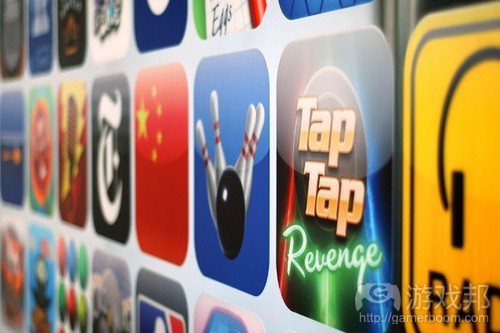阐述手机游戏开发商&发行商关系的变化
作者:James Brightman
Digital Chocolate CEO Trip Hawkins最近就应用商店的拥挤状况发表评论,不满商店所有者的30%分成,称发行商将在促使手机开发者在饱和市场中脱颖而出发挥重要作用。我们日前就此采访若干手机开发者,有趣的是,他们给予的回应各不相同。
目前苹果App Store有7.5万款游戏,要在这里得到关注非常困难。EA首席执行官John Riccitiello显然同意EA创始人Hawkins的看法,期望看到更富创造性的开发者同EA Mobile进行合作。
Woo Games创始人及CTO Ernest Woo同意这一观点,他表示,在如今的手机领域,发行商逐步变成必要元素。
“多数开发者依然不重视这一过程,存在这样的误解,‘若我能够推出高质量的内容,用户无疑会发现我的作品,作品就能够取得成功。’但显然事实情况通常并非如此” ——Ron Alpert
他表示,“我同意这样的说法,应用商店相当于数字领域的零售店面——它们不负责帮用户搜寻特定应用。我要提醒心存这类天真想法的开发者——2012年的应用销售情况同2009年已经大为不同。如今的市场过于饱和。应用商店需要过滤器,它们本身无法做到这点——这就是发行商的作用所在。”而PlayScreen CCO William Volk则并不认同此发行商重要性论断。
他表示,“iOS用户是否真的在乎发行商是谁?是否有因发行商而令作品大获成功的事例?相反,我看到诸如《Ski Safari》之类的游戏作品因简单和精致设计及杰出玩法而挤入排行榜前列。没有人知道发行商Defiant Development是谁,他们之前的作品《火箭兔子》还没有挤进前500之列。《Ski Safari》目前处在前10位置。没错,就把握市场情况,提供发行建议及提高曝光度方面,发行商确实发挥重要作用。但这无法改变这款游戏是靠标题取胜的事实。”
GRL Games联合创始人及CEO Graeme Devine没有参与此发行商话题的讨论,但他不同意大家把责任推给应用商店。
他评论称,“我觉得这就有点像是出现无数网站、无数书籍或构思。你不应责备容纳这些内容的容器,而是应该发挥创造性思维,吸引用户的眼球。”
Headcase Games联合创始人Ron Alpert表示,谷歌或苹果的分成比例完全合乎情理,因为它们需要承载这些游戏,替手机用户把关作品质量。关于发行商问题,他基本同意Hawkins的看法,他表示,多数开发者都不知道要如何提高游戏的曝光度。
他表示,“首先,我并不想要和应用商店所有者(苹果、谷歌和亚马逊等)争论分成问题;就他们所提供的服务(游戏邦注:宽频、某种程度的质量把控、潜在曝光度及许多其他功能)而言,30%分成是个合理比例。至于应用商店的曝光度,多年以来,应用开发者都需要认真考虑适销情况及其原因,方能令自己的作品获得最大程度的曝光,进而取得成功。即便到现在,多数开发者依然不重视这一过程,脑中存在这样的误解,‘若我能够推出高质量的内容,用户无疑会发现我的作品,它就能够取得成功。’但显然事实情况通常并非如此。”
“开发者和发行商之间的关系已彻底发生改变。发行合作关系和兼并决策需要更加公正” ——Chris Ulm
Alpert继续说道,“由于多数小型开发者都不重视或误解开发过程中的这一重要元素,和发行商或专业营销/推广团队合作,有效提高产品曝光度的开发公司多半将取得更杰出的成绩;否则,应用开发将会过度取决于运气,如今很多小型开发公司认为这完全是在浪费时间和金钱。”
Appy Entertainment CEO Chris Ulm最终在手机领域发现巨大机会,但关于未来发行商的地位,Ulm认为,如果他们想要参与其中,应该给予开发者更多控制权限。
他表示,“有若干趋势将加速手机游戏市场的稳固。就如Trip Hawkins提到的,曝光度和用户获取如今变得越来越棘手,想要在这两方面取得突出成绩的开发公司无疑需要提供高质量的内容,这对高水准的独立公司来说将越来越有吸引力。此外,开发成本也越来越高,所以如果你是家聘有员工及需要支付工资的实体公司,那么多半会更多着眼于趋利避害的交易。”
“但我相信,开发者和发行商之间的关系已彻底发生改变。许多手机开发者都有独立发行经验——发行合作关系和兼并决策需要更加公正,因为应用开发者非常熟悉具体业务,知道如何进行设计。这会令手机开发者变得更加吹毛求疵,但同时也变成更完美的合作伙伴,能够创造呈现杰出用户体验及一经曝光就带来丰厚收益的游戏作品。”(本文为游戏邦/gamerboom.com编译,拒绝任何不保留版权的转载,如需转载请联系:游戏邦)
Mobile Gaming: “The Relationship Between Developer and Publisher Has Changed Forever”
By James Brightman
Mobile developers react to Trip Hawkins’ assertions about app store economics and the role of publishers
Trip Hawkins, CEO of Digital Chocolate, recently commented on the crowded state of app stores, begrudging the store owners their 30 percent cut and noting that publishers will be increasingly needed to help mobile developers stand out from the pack. GamesIndustry International spoke with several mobile developers, and their responses on the matter were interestingly mixed.
There are about 75,000 games on Apple’s App Store currently, and getting noticed is indeed difficult. EA CEO John Riccitiello would no doubt agree with EA founder Hawkins’ assessment, and would certainly love to see more innovative developers partner with EA Mobile.
Ernest Woo, founder and CTO of Woo Games, agrees that in today’s mobile marketplace publishers are becoming a necessity.
“Most developers treat that part of the process as an afterthought with the misconception ‘if I realize something of quality, the audience will surely find it and it will be a success’ but of course this is seldom reality” ——Ron Alpert
“I agree that app stores are the digital equivalent of a retail storefront – they are not responsible for helping a user discover any particular app out there. I caution developers in clinging to the naive view that selling an app in 2012 is exactly like selling an app in 2009. The market is just too crowded. The app stores need a filter that they cannot provide – that’s where publishers come in,” he said.
William Volk, PlayScreen CCO, on the other hand, doesn’t really buy into the publisher argument.
“Do iOS users really care who the publisher is? What examples are out there of a game succeeding because of who published it? Instead I see titles like Ski Safari hitting top ranks on the basis of being a simple and beautiful game with awesome playability,” he said. “No one knew who the publisher Defiant Development was, and their prior title Rocket Bunnies never broke into the top 500. Ski Safari is sitting pretty in the top 10 right now. Yes, a publisher can add great value in terms of understanding the market, providing suggestions and getting folks to know about the title. It still doesn’t change the fact that this is a title-driven business.”
Graeme Devine, GRL Games Co-founder & CEO, didn’t weigh in on the publisher issue, but he does not agree with those who place blame on the app storefronts.
“I think that’s kind of like saying there’s a million websites, or a million books, or a million ideas. You don’t blame the box that holds them all, you need to look and think outside the box to get people excited to come to you,” he remarked.
Indeed, Ron Alpert, Headcase Games Co-founder, argues that the cut Google or Apple takes is totally fair considering that they have to host all the games and maintain some sort of quality for mobile consumers. On the publishers issue, he does largely agree with Hawkins, noting that most developers are clueless about getting their games exposure.
“First of all, I don’t take issue with app store owners (Apple, Google, Amazon, etc) taking a cut of my profits; 30 percent is a fair share for what they provide (bandwidth, some degree of quality control, potential for visibility, among many other features),” he stated. “As for discovery on app stores, it’s been the case for years now that app developers need to strongly consider the how’s and why’s of marketability in order for their products to stand any kind of chance for visibility and potential success. Even now, most developers treat that part of the process as an afterthought with the misconception ‘if I realize something of quality, the audience will surely find it and it will be a success’ but of course this is seldom reality.”
“The relationship between developer and publisher has changed forever… publishing partnerships and acquisitions will have to be much more even-handed” ——Chris Ulm
Alpert continued, “As most smaller developers are therefore inconsiderate or misinformed about this very important element of the development process, many would do well to team up with a publisher or dedicated marketing/promotion team to better raise their products’ visibility; otherwise app development is really just throwing too much to chance, and many smaller outfits nowadays are finding it to be a waste of time and money.”
Chris Ulm, Appy Entertainment CEO, ultimately sees big changes in the mobile market, but in terms of the role of publishers going forward, Ulm believes that they’ll have to relinquish more power to the developers if they still want to be involved.
“There are several trends which will hasten the consolidation of the mobile game market. As Trip Hawkins has pointed out, discovery and user acquisition is getting more and more difficult and companies that are good at this will inevitably need high quality content, which will increasingly become attractive for high quality independents. Development costs are also rising, so If you are a real company with employees and payroll, deals that preserve some upside but limit the downside risk will become the norm,” he said.
“I do believe, however, that the relationship between developer and publisher has changed forever. Many mobile developers have the experience of self-publishing – publishing partnerships and acquisitions will have to be much more even-handed because app developers intimately understand the business side and know how to design for it. This will make mobile developers more demanding but also much better partners in creating successful games that have great user experiences and are able to make money once discovered.”(Source:gamesindustry)









































 闽公网安备35020302001549号
闽公网安备35020302001549号